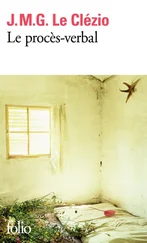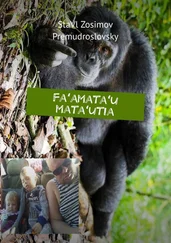It was all like in the drawing. The page had been torn off the writing-pad one day, and some unknown child had drawn those figures with a blue ball-point and coloured pencils. They’d appeared quite naturally, almost as if they’d always been there and only needed to be copied. It was only a vision of the world, after all, one vision among so many others. But here everything was complete, perfect, finished down to the last detail. Fate was there somewhere, perhaps in the shape of the sun or in the black specks in the middle of the eyes. Death was present too, in the teeth of the man on the left or in the scribbles of hair. War, love and ignorance were there. Age that comes too fast, and self-wasting time, and spirit slowly dwindling. It was funny, grotesque, moving, sad, magical. It was an image of life. Yes, it was that and more than that — a witness to life here on earth, the human signature, simple and mysterious. It was the epic, the strange epic, reduced to its simplest form and just set down here, by chance, on this single sheet of paper torn from the block.
Could one really try to understand what it meant? Was there anything there to understand? I mean, the drawing had just appeared, at this moment in this century, produced by the unskilful hand of a child, without any evident necessity. Try as you might you couldn’t find the clue to the enigma, you couldn’t point out the general drift or learn the secret meaning. If there was anything at all on the scribbled page it was the same thing as was in the world. The presence of life, perhaps; the evidence of life speaking for itself. In the face of the terrible void the thin paper surface resisted as if it were marble or tungsten. Nothing could tear it, nothing could break it. It was the soft rampart, the frail and tender shield that was the only reason of life. Not even a word; not even a sign; no, just the screen, the delicate screen that protects and absolves millions of lives and acts. All culture trembled in this square of paper — all cursed and impenetrable culture condensed into a few lines. What was the point in lying? Since the darkest night of time it had always been the same; no one had begun to understand. However many words and theories they heaped on top of one another it was always the same spectacle, strong and hermetic, that offered. All beauty. All ignominy. All passion, all joy, all mourning.
Perhaps, after all, it was a sort of evidence: evidence that there was nothing to understand. There was nothing else to do but take that sheet of writing-paper and draw on it with a blue ball-point and coloured pencils. Just in order to fix history for a few seconds.
Now, on the paper, two human shapes held hands and faced the void. From the middle of their faces their wide eyes looked fearfully into yours. The little boy, on the left, showed his teeth like a corpse. A rabbit looked at you too, from his overall. Above the two figures two roads like a couple of snakes, one blue one green, each joined two houses together. Between them was a tree with two enormous cherries on it, unless it was a street-lamp. Almost at the top of the page was the green and blue sun, like an insect, and above that the line of the mountains and the clouds ran right across the page like a row of teeth.
So when you’d drawn this motionless story there was nothing more to add.
At a pinch you could write something, as Chancelade did, holding the ball-point between his thumb and forefinger; and that too was a sort of human legend.
‘The sea is blue, it has waves. The lion is in the cage. The Panther is angry. The Leopard has claws. The elephant has a long trunk. The Monkey eats monkey-nuts. The wolf is very cruel. The bear can swim.’
And underneath you’d add another drawing, with little men and women, and birds, and butterflies, and flowers, and cats,

Attending his father’s funeral, for example. But before that, Chancelade had gone into the big dark room with the candles burning. He’d smelt the bitter-sweet smell of smoke and lavender. Then someone had put a hand on his shoulder and pushed him forward — his mother, or perhaps his aunt. Then he went towards the white bed where the man lay in the attitude of someone sleeping. But you could see at a glance that he wasn’t asleep: it had all been faked. They’d put the body on unnaturally clean sheets and folded the hands together on the breast, each finger exactly in place. Under the head they’d put a new pillow, and they’d carefully combed the black hair, keeping the parting on the left. At the foot of the bed there were some mauve flowers in a vase, and on the bedside table a Bible bound in red leather with a big gold cross.
Chancelade went a few steps forward to free himself of the hand on his shoulder, and looked at the bed and his father’s body. He’d never seen such a body: white, light, so light it seemed to float over the bed, several inches above the sheets. The hands were white, and so was the face — almost transparent, fragile, on the point of dissolving in the hazy atmosphere. It was like a child’s balloon, or a bubble, that might be blown right across the room by the slightest draught. There was also that pale, delicate light that seemed to emanate from the skin and envelop the body, the clothes, and even the bed of the dead man. However tightly his eyes, his mouth, his nostrils and his ears were closed, the man was still there, shut up inside his skin, and he knew everything that was going on. He was hiding, that was all. He’d hidden in a corner of his skull, or under his left eye perhaps, or else taken refuge, the whole of him, in the forefinger of his right hand; and he was listening to everything that was said and watching everything that was done all around him. Perhaps he wouldn’t be able to restrain himself and would suddenly make a face and burst out laughing. Everyone else would be frightened, but he, Chancelade, wouldn’t move a muscle, only smile faintly like one who knows.
When the boy had been beside the bed for a quarter of an hour or more, the same hand as before got hold of him again, only this time by the arm, and took him to the other side of the room. He sat down on a chair and watched what went on. The shapes of men and women moved about in the half-light. People came in through the door, bent over the bed, sometimes holding a handkerchief under their nose as if there were an epidemic, then went away whispering. Some came over to the chair where the boy was sitting and looked at him strangely as they patted his cheek. Chancelade watched and listened to them without saying anything, but he felt like laughing when he thought that he was the only one who knew the truth. Every time someone came and whispered in his ear he strained towards the bed to see whether the man hadn’t flickered his eye-lid in a conspiratorial wink. But he was very good at it; his eyes were always shut and you could never catch him..
Chancelade didn’t think he’d ever be so good at pretending, himself. He’d tried shamming dead once or twice with his friends or with his cousin Odile. But he could never keep a straight face for more than a few seconds, and after that he started to blink and bubble with laughter. And if anyone tickled him that finished it.
That was an idea. When the time came to go and the hand took him by the shoulder to lead him out of the room, he pulled himself free and went over to the bed all by himself. Then he leaned forward and touched his father’s arm. So that the others shouldn’t realize what he was doing he acted as though he were very very sad and wanted to be by himself for a moment. But what he really did was pinch his father’s arm as hard as he could. Through the stuff of his jacket he felt the arm, hard and cold, and his nails sank into the flesh. But surprising as it might seem the man didn’t utter a sound. His white face remained impassive and the brown-stained eye-lids did not stir. Chancelade was astonished and went on pinching the arm for several seconds, until his mother came and pulled him away. Then Chancelade was ashamed. He pushed aside the hand that held him and hurried out of the room. Then he went and hid in the kitchen and wetted his eyes with water from the tap to make it look as if he’d been crying. At least that seemed to please everyone who came to look for him, and lots of women bent down and kissed and whispered over him.
Читать дальше













